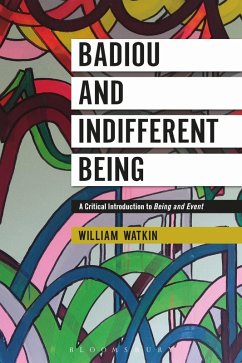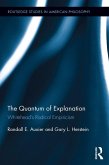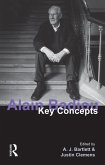23,95 €
23,95 €
inkl. MwSt.
Sofort per Download lieferbar

12 °P sammeln
23,95 €
Als Download kaufen

23,95 €
inkl. MwSt.
Sofort per Download lieferbar

12 °P sammeln
Jetzt verschenken
Alle Infos zum eBook verschenken
23,95 €
inkl. MwSt.
Sofort per Download lieferbar
Alle Infos zum eBook verschenken

12 °P sammeln
- Format: ePub
- Merkliste
- Auf die Merkliste
- Bewerten Bewerten
- Teilen
- Produkt teilen
- Produkterinnerung
- Produkterinnerung

Bitte loggen Sie sich zunächst in Ihr Kundenkonto ein oder registrieren Sie sich bei
bücher.de, um das eBook-Abo tolino select nutzen zu können.
Hier können Sie sich einloggen
Hier können Sie sich einloggen
Sie sind bereits eingeloggt. Klicken Sie auf 2. tolino select Abo, um fortzufahren.

Bitte loggen Sie sich zunächst in Ihr Kundenkonto ein oder registrieren Sie sich bei bücher.de, um das eBook-Abo tolino select nutzen zu können.
The first critical work to attempt the mammoth undertaking of reading Badiou's Being and Event as part of a sequence has often surprising, occasionally controversial results.
Looking back on its publication Badiou declared: "I had inscribed my name in the history of philosophy". Later he was brave enough to admit that this inscription needed correction. The central elements of Badiou's philosophy only make sense when Being and Event is read through the corrective prism of its sequel, Logics of Worlds , published nearly twenty years later.
At the same time as presenting the only complete…mehr
- Geräte: eReader
- mit Kopierschutz
- eBook Hilfe
- Größe: 1.93MB
Andere Kunden interessierten sich auch für
![Badiou and Indifferent Being (eBook, PDF) Badiou and Indifferent Being (eBook, PDF)]() William WatkinBadiou and Indifferent Being (eBook, PDF)23,95 €
William WatkinBadiou and Indifferent Being (eBook, PDF)23,95 €![Badiou and Communicable Worlds (eBook, ePUB) Badiou and Communicable Worlds (eBook, ePUB)]() William WatkinBadiou and Communicable Worlds (eBook, ePUB)26,95 €
William WatkinBadiou and Communicable Worlds (eBook, ePUB)26,95 €![Topics in Modern Logic (eBook, ePUB) Topics in Modern Logic (eBook, ePUB)]() D. C. MakinsonTopics in Modern Logic (eBook, ePUB)33,95 €
D. C. MakinsonTopics in Modern Logic (eBook, ePUB)33,95 €![Plural Logic (eBook, ePUB) Plural Logic (eBook, ePUB)]() Alex OliverPlural Logic (eBook, ePUB)17,95 €
Alex OliverPlural Logic (eBook, ePUB)17,95 €![Badiou Reframed (eBook, ePUB) Badiou Reframed (eBook, ePUB)]() Alex LingBadiou Reframed (eBook, ePUB)17,95 €
Alex LingBadiou Reframed (eBook, ePUB)17,95 €![The Quantum of Explanation (eBook, ePUB) The Quantum of Explanation (eBook, ePUB)]() Randall E. AuxierThe Quantum of Explanation (eBook, ePUB)46,95 €
Randall E. AuxierThe Quantum of Explanation (eBook, ePUB)46,95 €![Alain Badiou (eBook, ePUB) Alain Badiou (eBook, ePUB)]() A. J. BartlettAlain Badiou (eBook, ePUB)34,95 €
A. J. BartlettAlain Badiou (eBook, ePUB)34,95 €-
-
-
The first critical work to attempt the mammoth undertaking of reading Badiou's Being and Event as part of a sequence has often surprising, occasionally controversial results.
Looking back on its publication Badiou declared: "I had inscribed my name in the history of philosophy". Later he was brave enough to admit that this inscription needed correction. The central elements of Badiou's philosophy only make sense when Being and Event is read through the corrective prism of its sequel, Logics of Worlds, published nearly twenty years later.
At the same time as presenting the only complete overview of Badiou's philosophical project, this book is also the first to draw out the central component of Badiou's ontology: indifference. Concentrating on its use across the core elements Being and Event-the void, the multiple, the set and the event-Watkin demonstrates that no account of Badiou's ontology is complete unless it accepts that Badiou's philosophy is primarily a presentation of indifferent being.
Badiou and Indifferent Being provides a detailed and lively section by section reading of Badiou's foundational work. It is a seminal source text for all Badiou readers.
Looking back on its publication Badiou declared: "I had inscribed my name in the history of philosophy". Later he was brave enough to admit that this inscription needed correction. The central elements of Badiou's philosophy only make sense when Being and Event is read through the corrective prism of its sequel, Logics of Worlds, published nearly twenty years later.
At the same time as presenting the only complete overview of Badiou's philosophical project, this book is also the first to draw out the central component of Badiou's ontology: indifference. Concentrating on its use across the core elements Being and Event-the void, the multiple, the set and the event-Watkin demonstrates that no account of Badiou's ontology is complete unless it accepts that Badiou's philosophy is primarily a presentation of indifferent being.
Badiou and Indifferent Being provides a detailed and lively section by section reading of Badiou's foundational work. It is a seminal source text for all Badiou readers.
Produktdetails
- Produktdetails
- Verlag: Bloomsbury UK eBooks
- Seitenzahl: 296
- Erscheinungstermin: 21. September 2017
- Englisch
- ISBN-13: 9781350015685
- Artikelnr.: 49207470
- Verlag: Bloomsbury UK eBooks
- Seitenzahl: 296
- Erscheinungstermin: 21. September 2017
- Englisch
- ISBN-13: 9781350015685
- Artikelnr.: 49207470
- Herstellerkennzeichnung Die Herstellerinformationen sind derzeit nicht verfügbar.
William Watkin is professor of contemporary literature and philosophy at Brunel University, UK. He is the author of In the Process of Poetry: The New York School and the Avant-Garde (2001), On Mourning: Theories of Loss in Modern Literature (2004), The Literary Agamben (2010) Agamben and Indifference (2014) and Badiou and Indifferent Being (Bloomsbury, 2017).
preface acknowledgements Introduction: Subtractive Being
Nonrelationality
Indifference
Set Theory
Retroactive Axiomatic Reasoning
Transmissibility, Intelligibility and Communicability
Theory of the Subject Chapter One: Being: The One and the Multiple How to Prove that the One Is-Not (Meditation One)
The One as Operational Counts-as-One
The Ancient Problem of Classes
Situations and Structures
The Multiple
Presentation of Presentation
Reasoning on Being by Means of Axioms
How to Accept that Being Is-Not Chapter Two: Being: Separation, Void, Mark Meditation Two
Set Theory and Aggregation as Collection (Meditation Three)
Axiom of Separation
Notation and Self-Predication
The Pure Multiple is Real
The Void: Proper Name of Being (Meditation Four)
The Void and Nothing
Void as Nomination
ZF+C: The Nine Axioms of Contemporary Set Theory (Meditation 5)
Axiom of Extensionality
Axiom of Replacement or Substitution
The Void Set and In-Difference
Meditation Six: Aristotle
Conclusion: Pure Multiple and the Void Chapter Three: Being and Excess Powerset Axiom (Meditation Seven)
Point of Excess
Void as Name
Four Kinds of One-ness: One, Count-as-one, Unicity, forming-into-one
The State (Meditation Eight)
Threat of the Void
Belonging, Inclusion and Parts
Typologies of Being
States and Indifference (Meditation Nine) Chapter Four: Nature and Infinity Nature is Normal (Meditation Eleven)
Transitive Sets: Cardinal and Ordinal (Meditation Twelve)
Nature and Minimality
Nature and Intrication
The Inexistence of Nature
Potential and Actual Infinity
Proving the Actual Infinite
Doubling and Dedekind Infinites
Frege and Equinumerosity Chapter Five: Infinity, Limit and Succession The Limit
Succession and Limit
The Upper or Maximal Limit
Succession
Infinite Thought: Problems of Procedure (Meditation Thirteen)
In-Different Other: The Second Existential Seal
There is some infinity in natural multiples (Meditation Fourteen)
Conclusion on Being Chapter Six: The Event: History and Ultra-One Historical Singularities (Meditation Sixteen)
Historical Singularities, and Evental Sites: Examples
Primal Ones and the Edge of the Void
Singularity vs. Normality
Self-Predication: The Matheme of the Event (Meditation Seventeen)
The Problem of Naming
Axiom of Foundation (Meditation Eighteen)
Implications of Foundation
Coda: Un-Relation Chapter Seven: The Event, Intervention and Fidelity The Wager: yes or no (Meditation Twenty)
Intervention
Seven Consequences of the Event
Axiom of Choice (Meditation Twenty Two)
Choice is Indifferent
Due to Choice, Singularities Exist and they are Indifferent
Fidelity, Connection (Meditation Twenty Three) Chapter Eight: The Generic Continuum Hypothesis: (Meditation Twenty-Seven)
The Thought of the Generic (Meditation Thirty-One)
Truth and Knowledge: The Indifference of Avoidance
Generic Procedure
The Matheme of the Indiscernible (Meditation Thirty-Three)
Easton's Theorem (Meditation Twenty-Six)
Conditioning the Indiscernible
Indiscernible or Generic Subsets
The Existence of the Indiscernible (Meditation Thirty-Four)
Extension
Is there a name for the discernible such that it can be said to exist? Chapter Nine: Forcing: Truth and Subject Theory of the Subject (Meditation Thirty-Five)
Subjectivization
Chance
Faith
Names
Forcing (Mediation Thirty-Six)
Leibniz's Identity of Indiscernibles (Meditation Thirty)
The Proof of Forcing (Meditation Thirty-Six)
From the Indiscernible to the Undecidable
Conclusion (Meditation Thirty-Seven)
bibliography index
Nonrelationality
Indifference
Set Theory
Retroactive Axiomatic Reasoning
Transmissibility, Intelligibility and Communicability
Theory of the Subject Chapter One: Being: The One and the Multiple How to Prove that the One Is-Not (Meditation One)
The One as Operational Counts-as-One
The Ancient Problem of Classes
Situations and Structures
The Multiple
Presentation of Presentation
Reasoning on Being by Means of Axioms
How to Accept that Being Is-Not Chapter Two: Being: Separation, Void, Mark Meditation Two
Set Theory and Aggregation as Collection (Meditation Three)
Axiom of Separation
Notation and Self-Predication
The Pure Multiple is Real
The Void: Proper Name of Being (Meditation Four)
The Void and Nothing
Void as Nomination
ZF+C: The Nine Axioms of Contemporary Set Theory (Meditation 5)
Axiom of Extensionality
Axiom of Replacement or Substitution
The Void Set and In-Difference
Meditation Six: Aristotle
Conclusion: Pure Multiple and the Void Chapter Three: Being and Excess Powerset Axiom (Meditation Seven)
Point of Excess
Void as Name
Four Kinds of One-ness: One, Count-as-one, Unicity, forming-into-one
The State (Meditation Eight)
Threat of the Void
Belonging, Inclusion and Parts
Typologies of Being
States and Indifference (Meditation Nine) Chapter Four: Nature and Infinity Nature is Normal (Meditation Eleven)
Transitive Sets: Cardinal and Ordinal (Meditation Twelve)
Nature and Minimality
Nature and Intrication
The Inexistence of Nature
Potential and Actual Infinity
Proving the Actual Infinite
Doubling and Dedekind Infinites
Frege and Equinumerosity Chapter Five: Infinity, Limit and Succession The Limit
Succession and Limit
The Upper or Maximal Limit
Succession
Infinite Thought: Problems of Procedure (Meditation Thirteen)
In-Different Other: The Second Existential Seal
There is some infinity in natural multiples (Meditation Fourteen)
Conclusion on Being Chapter Six: The Event: History and Ultra-One Historical Singularities (Meditation Sixteen)
Historical Singularities, and Evental Sites: Examples
Primal Ones and the Edge of the Void
Singularity vs. Normality
Self-Predication: The Matheme of the Event (Meditation Seventeen)
The Problem of Naming
Axiom of Foundation (Meditation Eighteen)
Implications of Foundation
Coda: Un-Relation Chapter Seven: The Event, Intervention and Fidelity The Wager: yes or no (Meditation Twenty)
Intervention
Seven Consequences of the Event
Axiom of Choice (Meditation Twenty Two)
Choice is Indifferent
Due to Choice, Singularities Exist and they are Indifferent
Fidelity, Connection (Meditation Twenty Three) Chapter Eight: The Generic Continuum Hypothesis: (Meditation Twenty-Seven)
The Thought of the Generic (Meditation Thirty-One)
Truth and Knowledge: The Indifference of Avoidance
Generic Procedure
The Matheme of the Indiscernible (Meditation Thirty-Three)
Easton's Theorem (Meditation Twenty-Six)
Conditioning the Indiscernible
Indiscernible or Generic Subsets
The Existence of the Indiscernible (Meditation Thirty-Four)
Extension
Is there a name for the discernible such that it can be said to exist? Chapter Nine: Forcing: Truth and Subject Theory of the Subject (Meditation Thirty-Five)
Subjectivization
Chance
Faith
Names
Forcing (Mediation Thirty-Six)
Leibniz's Identity of Indiscernibles (Meditation Thirty)
The Proof of Forcing (Meditation Thirty-Six)
From the Indiscernible to the Undecidable
Conclusion (Meditation Thirty-Seven)
bibliography index
preface acknowledgements Introduction: Subtractive Being
Nonrelationality
Indifference
Set Theory
Retroactive Axiomatic Reasoning
Transmissibility, Intelligibility and Communicability
Theory of the Subject Chapter One: Being: The One and the Multiple How to Prove that the One Is-Not (Meditation One)
The One as Operational Counts-as-One
The Ancient Problem of Classes
Situations and Structures
The Multiple
Presentation of Presentation
Reasoning on Being by Means of Axioms
How to Accept that Being Is-Not Chapter Two: Being: Separation, Void, Mark Meditation Two
Set Theory and Aggregation as Collection (Meditation Three)
Axiom of Separation
Notation and Self-Predication
The Pure Multiple is Real
The Void: Proper Name of Being (Meditation Four)
The Void and Nothing
Void as Nomination
ZF+C: The Nine Axioms of Contemporary Set Theory (Meditation 5)
Axiom of Extensionality
Axiom of Replacement or Substitution
The Void Set and In-Difference
Meditation Six: Aristotle
Conclusion: Pure Multiple and the Void Chapter Three: Being and Excess Powerset Axiom (Meditation Seven)
Point of Excess
Void as Name
Four Kinds of One-ness: One, Count-as-one, Unicity, forming-into-one
The State (Meditation Eight)
Threat of the Void
Belonging, Inclusion and Parts
Typologies of Being
States and Indifference (Meditation Nine) Chapter Four: Nature and Infinity Nature is Normal (Meditation Eleven)
Transitive Sets: Cardinal and Ordinal (Meditation Twelve)
Nature and Minimality
Nature and Intrication
The Inexistence of Nature
Potential and Actual Infinity
Proving the Actual Infinite
Doubling and Dedekind Infinites
Frege and Equinumerosity Chapter Five: Infinity, Limit and Succession The Limit
Succession and Limit
The Upper or Maximal Limit
Succession
Infinite Thought: Problems of Procedure (Meditation Thirteen)
In-Different Other: The Second Existential Seal
There is some infinity in natural multiples (Meditation Fourteen)
Conclusion on Being Chapter Six: The Event: History and Ultra-One Historical Singularities (Meditation Sixteen)
Historical Singularities, and Evental Sites: Examples
Primal Ones and the Edge of the Void
Singularity vs. Normality
Self-Predication: The Matheme of the Event (Meditation Seventeen)
The Problem of Naming
Axiom of Foundation (Meditation Eighteen)
Implications of Foundation
Coda: Un-Relation Chapter Seven: The Event, Intervention and Fidelity The Wager: yes or no (Meditation Twenty)
Intervention
Seven Consequences of the Event
Axiom of Choice (Meditation Twenty Two)
Choice is Indifferent
Due to Choice, Singularities Exist and they are Indifferent
Fidelity, Connection (Meditation Twenty Three) Chapter Eight: The Generic Continuum Hypothesis: (Meditation Twenty-Seven)
The Thought of the Generic (Meditation Thirty-One)
Truth and Knowledge: The Indifference of Avoidance
Generic Procedure
The Matheme of the Indiscernible (Meditation Thirty-Three)
Easton's Theorem (Meditation Twenty-Six)
Conditioning the Indiscernible
Indiscernible or Generic Subsets
The Existence of the Indiscernible (Meditation Thirty-Four)
Extension
Is there a name for the discernible such that it can be said to exist? Chapter Nine: Forcing: Truth and Subject Theory of the Subject (Meditation Thirty-Five)
Subjectivization
Chance
Faith
Names
Forcing (Mediation Thirty-Six)
Leibniz's Identity of Indiscernibles (Meditation Thirty)
The Proof of Forcing (Meditation Thirty-Six)
From the Indiscernible to the Undecidable
Conclusion (Meditation Thirty-Seven)
bibliography index
Nonrelationality
Indifference
Set Theory
Retroactive Axiomatic Reasoning
Transmissibility, Intelligibility and Communicability
Theory of the Subject Chapter One: Being: The One and the Multiple How to Prove that the One Is-Not (Meditation One)
The One as Operational Counts-as-One
The Ancient Problem of Classes
Situations and Structures
The Multiple
Presentation of Presentation
Reasoning on Being by Means of Axioms
How to Accept that Being Is-Not Chapter Two: Being: Separation, Void, Mark Meditation Two
Set Theory and Aggregation as Collection (Meditation Three)
Axiom of Separation
Notation and Self-Predication
The Pure Multiple is Real
The Void: Proper Name of Being (Meditation Four)
The Void and Nothing
Void as Nomination
ZF+C: The Nine Axioms of Contemporary Set Theory (Meditation 5)
Axiom of Extensionality
Axiom of Replacement or Substitution
The Void Set and In-Difference
Meditation Six: Aristotle
Conclusion: Pure Multiple and the Void Chapter Three: Being and Excess Powerset Axiom (Meditation Seven)
Point of Excess
Void as Name
Four Kinds of One-ness: One, Count-as-one, Unicity, forming-into-one
The State (Meditation Eight)
Threat of the Void
Belonging, Inclusion and Parts
Typologies of Being
States and Indifference (Meditation Nine) Chapter Four: Nature and Infinity Nature is Normal (Meditation Eleven)
Transitive Sets: Cardinal and Ordinal (Meditation Twelve)
Nature and Minimality
Nature and Intrication
The Inexistence of Nature
Potential and Actual Infinity
Proving the Actual Infinite
Doubling and Dedekind Infinites
Frege and Equinumerosity Chapter Five: Infinity, Limit and Succession The Limit
Succession and Limit
The Upper or Maximal Limit
Succession
Infinite Thought: Problems of Procedure (Meditation Thirteen)
In-Different Other: The Second Existential Seal
There is some infinity in natural multiples (Meditation Fourteen)
Conclusion on Being Chapter Six: The Event: History and Ultra-One Historical Singularities (Meditation Sixteen)
Historical Singularities, and Evental Sites: Examples
Primal Ones and the Edge of the Void
Singularity vs. Normality
Self-Predication: The Matheme of the Event (Meditation Seventeen)
The Problem of Naming
Axiom of Foundation (Meditation Eighteen)
Implications of Foundation
Coda: Un-Relation Chapter Seven: The Event, Intervention and Fidelity The Wager: yes or no (Meditation Twenty)
Intervention
Seven Consequences of the Event
Axiom of Choice (Meditation Twenty Two)
Choice is Indifferent
Due to Choice, Singularities Exist and they are Indifferent
Fidelity, Connection (Meditation Twenty Three) Chapter Eight: The Generic Continuum Hypothesis: (Meditation Twenty-Seven)
The Thought of the Generic (Meditation Thirty-One)
Truth and Knowledge: The Indifference of Avoidance
Generic Procedure
The Matheme of the Indiscernible (Meditation Thirty-Three)
Easton's Theorem (Meditation Twenty-Six)
Conditioning the Indiscernible
Indiscernible or Generic Subsets
The Existence of the Indiscernible (Meditation Thirty-Four)
Extension
Is there a name for the discernible such that it can be said to exist? Chapter Nine: Forcing: Truth and Subject Theory of the Subject (Meditation Thirty-Five)
Subjectivization
Chance
Faith
Names
Forcing (Mediation Thirty-Six)
Leibniz's Identity of Indiscernibles (Meditation Thirty)
The Proof of Forcing (Meditation Thirty-Six)
From the Indiscernible to the Undecidable
Conclusion (Meditation Thirty-Seven)
bibliography index







